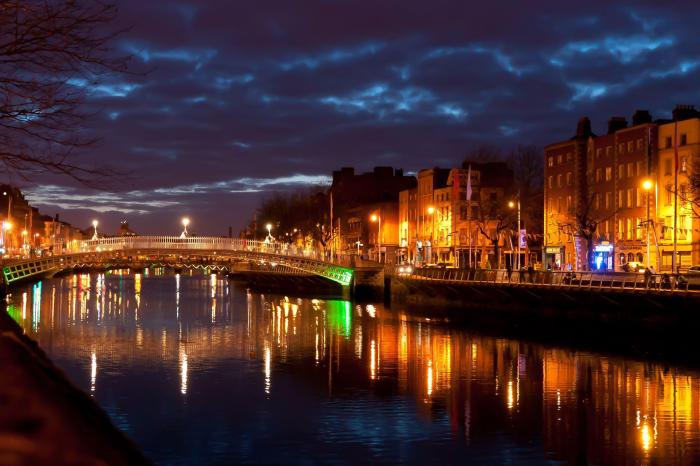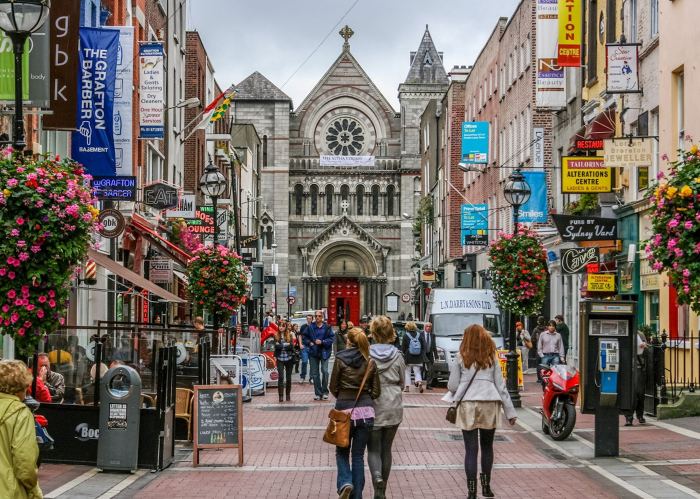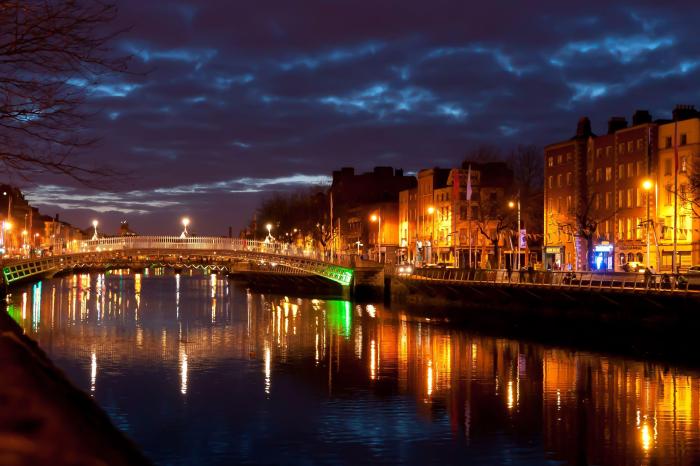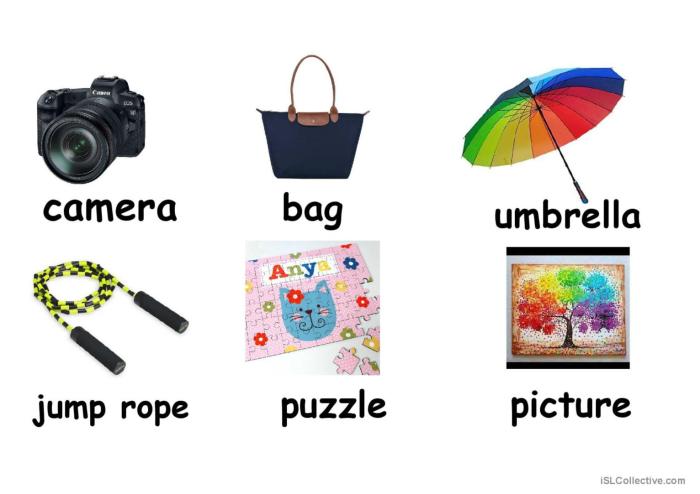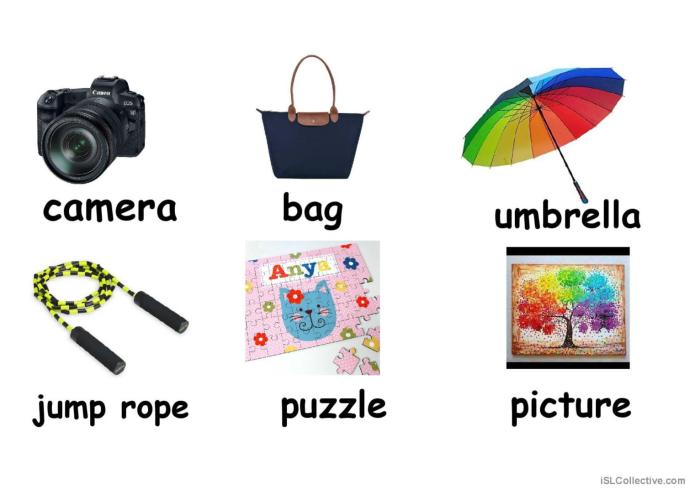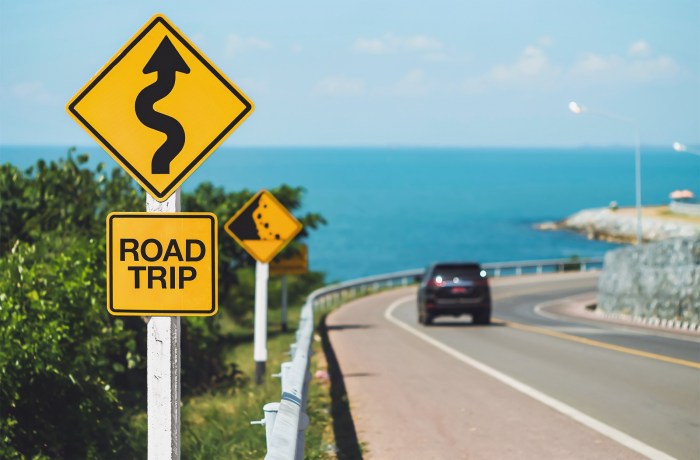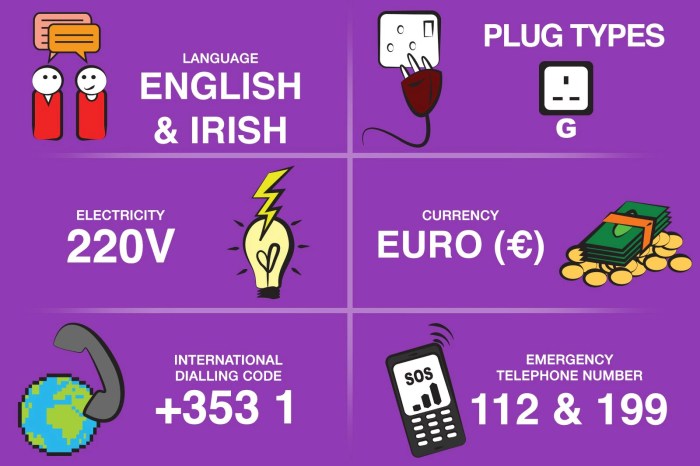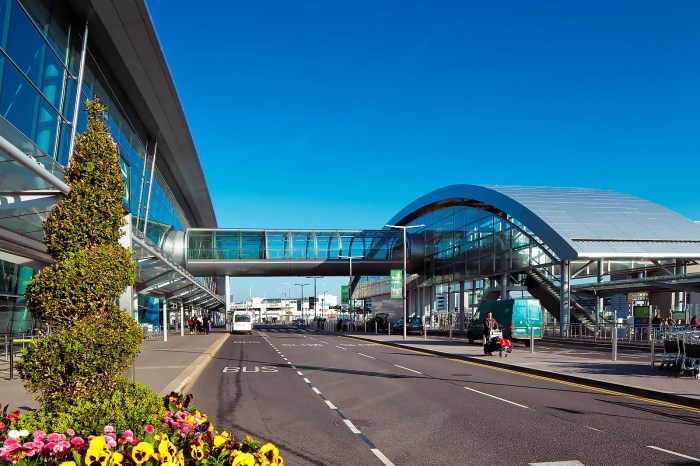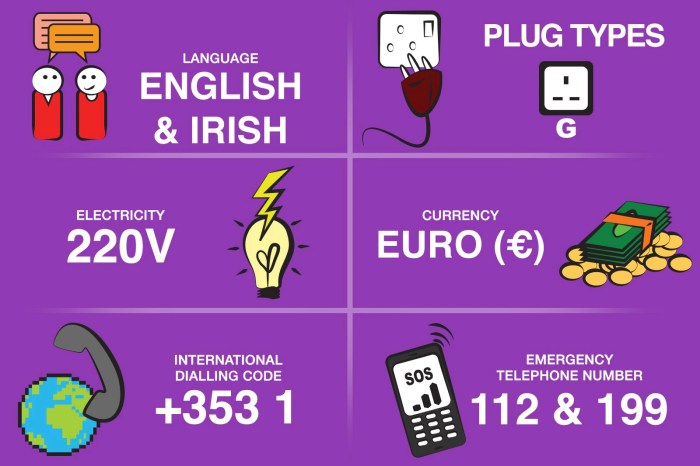Things to know before traveling to Dublin! From historical landmarks to vibrant nightlife, Dublin offers a captivating experience. This guide covers everything from essential information and practical considerations to must-see attractions, food and drink, events, and getting around. Discover the best time to visit, transportation options, and accommodation choices, plus local customs and safety tips. Prepare for an unforgettable Irish adventure!
Uncover the secrets of Dublin’s rich history and culture, discover the best neighborhoods, and plan your perfect itinerary. Learn about the local currency, customs, and language to ensure a smooth and enjoyable trip. This comprehensive guide will empower you to make the most of your Dublin adventure.
Essential Information
Dublin, Ireland’s vibrant capital, boasts a rich tapestry of history and culture, interwoven with a modern spirit. From its medieval streets to its contemporary art scene, Dublin offers a unique blend of old and new. This city pulses with life, attracting visitors with its welcoming atmosphere and unforgettable experiences.
Dublin’s History and Culture
Dublin’s history stretches back centuries, leaving its mark on the city’s architecture and traditions. The city was a major trading hub during the Viking era and later became a significant centre for Irish literature and politics. Today, you’ll find remnants of this rich past in historical sites like Trinity College, Dublin Castle, and the Guinness Storehouse, showcasing a continuous evolution from ancient roots to the present day.
Irish music, literature, and a warm, welcoming hospitality are key aspects of Dublin’s culture, deeply embedded in its identity.
Best Time to Visit
The best time to visit Dublin depends heavily on your interests. For pleasant weather and fewer crowds, spring (April-May) and autumn (September-October) are excellent choices. Summer (June-August) brings vibrant festivals and longer daylight hours, perfect for exploring outdoor spaces. Winter (November-March) offers a different charm, with festive events and cozy pubs, though the weather can be unpredictable.
If you’re looking to experience a particular festival, check the dates in advance. For example, the St. Patrick’s Day parade is a major event held in March.
Transportation in Dublin
Dublin offers several convenient transportation options. The Luas tram system provides efficient and affordable transport within the city centre. Dublin Bus offers a comprehensive network of routes throughout the city and surrounding areas. For short distances, walking is an excellent way to explore the charming streets and discover hidden gems. Cycling is also becoming increasingly popular, with dedicated cycle paths throughout the city.
Taxis are readily available, but fares can vary. Public transport is generally the most economical choice for navigating Dublin.
Dublin Neighborhoods
| Neighborhood | Characteristics |
|---|---|
| City Centre | Historic heart of Dublin, with major attractions, vibrant nightlife, and numerous restaurants. |
| Temple Bar | Famous for its pubs, live music, and lively atmosphere, often crowded. |
| South Dublin | Residential area with parks, gardens, and a more relaxed pace of life. |
| Portobello | Trendy area with independent shops, cafes, and a vibrant arts scene. |
| Howth | Coastal town offering scenic views, perfect for day trips and enjoying fresh seafood. |
Accommodation Options
Dublin offers a variety of accommodation options to suit different budgets and preferences. Hotels provide comfortable amenities and a range of services. Hostels are a budget-friendly option, ideal for social travellers. Airbnb offers a more local experience, providing a unique insight into Dublin’s diverse neighbourhoods. Each option has its own set of advantages and disadvantages.
Hotels often provide a higher level of service but come with a higher price tag. Hostels are ideal for meeting new people and sharing costs. Airbnb offers a chance to experience Dublin’s local life.
Planning a trip to Dublin? There’s a lot to consider, from the best time to visit to the hidden gems you shouldn’t miss. One important factor to research before you go is the current COVID-19 testing policies for hotels, as some places might have specific requirements. Checking out the latest information on hotels covid 19 tests is a must before booking your accommodation.
Ultimately, staying informed about these policies will help you plan a smooth and worry-free trip to Dublin!
Costs in Dublin
| Category | Approximate Cost (per person) |
|---|---|
| Activities (e.g., museum entry, guided tour) | €10-€30 |
| Meals (e.g., pub lunch, restaurant dinner) | €15-€40 |
| Transportation (e.g., Luas ride, bus fare) | €2-€5 |
| Accommodation (e.g., hostel dorm bed, mid-range hotel room) | €30-€100+ |
Practical Considerations
Dublin, a vibrant city brimming with history and charm, awaits visitors from around the globe. Navigating the practicalities of a trip, from currency to customs, ensures a smooth and enjoyable experience. This section delves into the essential details to help you plan your Irish adventure.
Currency and Exchange Rates
Dublin operates on the Euro (€). The exchange rate fluctuates daily, so it’s wise to check current rates before your trip. Using a reliable online converter or your bank’s exchange rate tools will provide an accurate estimation. Many shops and restaurants accept credit cards, but having some Euros on hand for smaller purchases or unexpected situations is always recommended.
Local Customs and Etiquette
Irish culture is warm and welcoming, with a strong emphasis on politeness and respect. Small talk and engaging with locals are encouraged. While directness is valued, avoid overly loud or boisterous behaviour in public spaces. It’s generally polite to remove your shoes before entering someone’s home. Understanding these subtle customs will make your interactions more enjoyable and respectful.
Local Language and Necessary Phrases
The official language of Ireland is Irish. While many people in Dublin speak English fluently, learning a few basic Irish phrases demonstrates respect for the local culture. Useful phrases include “Dia dhuit” (hello), “Go raibh maith agat” (thank you), and “Slán” (goodbye). These simple greetings will go a long way in fostering positive interactions.
Travel Documents
Valid passports and any necessary visas are crucial for entry into Ireland. The requirements vary based on your nationality. Check the Irish government’s website for precise details on visa regulations and ensure your passport has sufficient validity beyond your intended stay. For example, a US citizen typically does not require a visa for a short-term visit.
Safety Precautions
Dublin is a generally safe city. However, standard safety precautions apply. Be mindful of your belongings in crowded areas, and avoid walking alone at night in poorly lit streets. If you are staying in accommodation outside the city center, it’s always a good idea to have a copy of your itinerary with a trusted contact. Use reputable transportation services and be wary of scams.
Time Management Tips
Dublin offers numerous attractions and activities. Effective time management is key to maximizing your experience. Create a loose itinerary, but be prepared to adjust based on your interests and energy levels. Consider using a mobile app or a planner to keep track of your schedule. Leave some room for spontaneous discoveries!
Visa Requirements by Nationality, Things to know before traveling to dublin
Visa requirements for Dublin vary significantly based on nationality. Citizens of the European Union, for example, typically do not require a visa for short-term stays. However, those from outside the EU or the Schengen Area may need a visa. Always consult the official Irish government website for the most current and accurate information specific to your nationality.
Researching specific visa requirements beforehand will prevent unforeseen delays.
Potential Health Concerns and Precautions
| Potential Health Concern | Precautions |
|---|---|
| Foodborne Illness | Choose reputable restaurants and be cautious about consuming raw or undercooked foods. Ensure that any water consumed is bottled or properly purified. |
| Motion Sickness | If you are prone to motion sickness, consider taking medication before or during travel, especially by public transport. |
| Insect Bites | Use insect repellent, particularly during warmer months, and wear protective clothing. |
| Sunburn | Apply sunscreen with a high SPF and wear protective clothing. |
Staying informed about potential health concerns and taking necessary precautions is crucial for a safe and enjoyable trip.
Must-See Attractions
Dublin, a city steeped in history and vibrant culture, offers a wealth of attractions for every visitor. From ancient landmarks to modern museums, there’s something to captivate everyone. This section highlights the top historical sites, cultural institutions, and green spaces that should be on your Dublin itinerary.Exploring Dublin’s rich tapestry of history, culture, and vibrant nightlife provides a unique and unforgettable experience.
From the grandeur of historical landmarks to the artistic expressions in museums and galleries, Dublin offers a rich array of experiences. Discover the beauty of its parks and green spaces, and immerse yourself in the city’s lively nightlife.
Top 5 Historical Landmarks
Dublin boasts a rich history, reflected in its impressive collection of historical landmarks. These sites offer a glimpse into the city’s past and provide a deeper understanding of its evolution.
- Trinity College Library: Home to the Book of Kells, this magnificent library is a testament to Ireland’s literary heritage. The architecture is breathtaking, and the sheer scale of the collection is awe-inspiring. Its historical significance lies in its role as a centre of learning and its preservation of important historical texts.
- Dublin Castle: A historic fortress that has witnessed centuries of Irish history. From its role as a royal residence to its use as a centre of administration, the castle provides a fascinating glimpse into the country’s past.
- St. Patrick’s Cathedral: A grand cathedral that stands as a symbol of Dublin’s religious heritage. Its intricate architecture and historical significance make it a must-see for visitors interested in Irish culture and religious history.
- Kilmainham Gaol: This former prison holds a powerful historical narrative, serving as a poignant reminder of Ireland’s struggle for independence. It’s a sobering yet important place to reflect on the sacrifices made for freedom.
- Guinness Storehouse: While not strictly a historical landmark, its connection to Dublin’s brewing history and cultural identity makes it a worthwhile addition to this list. It provides a unique perspective on the city’s economic and social development.
Top 5 Museums and Galleries
Dublin offers a diverse range of museums and galleries, showcasing art, history, and culture from around the world.
- National Museum of Ireland – Archaeology: A comprehensive collection of artifacts that tells the story of Ireland’s rich archaeological past, from prehistoric times to the medieval period. The exhibits provide a fascinating insight into the daily lives and beliefs of the people who lived in Ireland over the centuries.
- National Gallery of Ireland: A renowned collection of European paintings spanning centuries, from the medieval period to the modern era. The gallery showcases masterpieces by renowned artists, offering a glimpse into the evolution of artistic styles and trends.
- Irish Museum of Modern Art (IMMA): IMMA offers a vibrant showcase of contemporary and modern art, reflecting the creativity and innovation of Irish and international artists.
- National Leprechaun Museum: A quirky and fun museum for those interested in Irish folklore and mythology. It provides a lighthearted perspective on Irish culture.
- Little Museum of Dublin: This museum offers a fascinating look into the city’s history through diverse collections, from everyday life to quirky historical events.
Top 5 Parks and Green Spaces
Dublin’s parks and green spaces offer respite from the city’s bustling atmosphere.
- St. Stephen’s Green: A beautiful Victorian-era park with a serene atmosphere. It’s perfect for a relaxing stroll, a picnic, or simply enjoying the tranquility.
- Phoenix Park: Ireland’s largest enclosed park, providing ample space for walking, cycling, or simply enjoying the outdoors. It’s home to Dublin Zoo and the President’s residence, adding to its appeal.
- Iveagh Gardens: A picturesque park with beautifully maintained gardens, offering a peaceful escape from the city’s urban environment.
- Merrion Square Park: A charming park located in the heart of the city, known for its Georgian architecture and tranquil atmosphere.
- Herbert Park: This park provides a tranquil escape from the city with its beautiful landscapes and diverse flora.
Nightlife Experiences
Dublin’s nightlife is renowned for its diverse offerings, from traditional pubs to modern bars and clubs.
- Traditional Pubs: Experience the quintessential Irish pub experience with live music, traditional Irish dancing, and hearty pub fare.
- Modern Bars: Explore a range of modern bars that cater to different tastes and preferences, from cocktail bars to trendy venues.
- Clubs: Discover Dublin’s vibrant club scene with live music and dancing.
- Live Music Venues: Dublin is a hotbed for live music, with numerous venues showcasing a wide variety of musical styles.
Restaurants and Pubs
Dublin’s culinary scene boasts a mix of traditional Irish dishes and international cuisine.
- Traditional Irish Pubs: Experience traditional Irish fare, such as hearty stews, seafood, and Irish soda bread.
- Fine Dining Restaurants: Enjoy a gourmet dining experience in Dublin’s upscale restaurants, offering innovative and delicious dishes.
- Casual Restaurants: Enjoy a casual meal in Dublin’s numerous cafes and restaurants offering a variety of cuisines.
Shopping Areas and Experiences
Dublin offers a variety of shopping experiences, from high-street stores to unique boutiques.
- High Street Shopping: Explore the city’s main shopping streets for a wide range of retail options, including clothing, accessories, and home goods.
- Independent Boutiques: Discover unique and stylish boutiques offering handcrafted goods, designer pieces, and local crafts.
Comparison of Tourist Attractions
| Attraction | Historical Significance |
|---|---|
| Trinity College Library | Preservation of historical texts, centre of learning |
| Dublin Castle | Royal residence, administrative centre |
| St. Patrick’s Cathedral | Symbol of Dublin’s religious heritage |
| Kilmainham Gaol | Important reminder of Ireland’s struggle for independence |
| Guinness Storehouse | Connection to Dublin’s brewing history and cultural identity |
Food and Drink
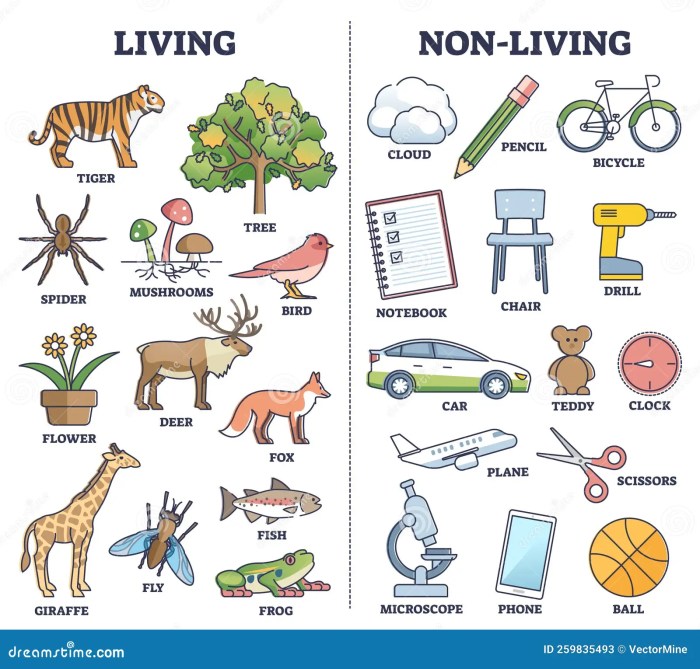
Dublin’s culinary scene offers a delightful blend of traditional Irish fare and international influences. The city’s vibrant atmosphere is complemented by a rich tapestry of flavors, reflecting its historical and cultural heritage. From hearty stews to creamy seafood dishes, Dublin provides a gastronomic journey for every palate.Irish cuisine boasts a history deeply intertwined with the country’s agricultural past and its unique cultural traditions.
Generations of families have passed down recipes and culinary techniques, creating a rich culinary heritage. Today, this tradition continues to evolve, with modern chefs incorporating contemporary techniques while respecting the foundational elements of Irish cooking.
Traditional Irish Dishes
Irish cuisine is renowned for its hearty and wholesome dishes. A significant portion of traditional Irish meals are centered around locally sourced ingredients, reflecting the country’s agricultural landscape. The availability of fresh produce and livestock directly influences the dishes.
- Irish Stew: A comforting stew featuring beef, mutton, or lamb, often combined with vegetables like carrots, potatoes, and onions, simmered in a flavorful broth.
- Colcannon: A traditional Irish dish consisting of mashed potatoes mixed with kale or cabbage. It is frequently seasoned with butter and sometimes with other ingredients like onions or cheese.
- Soda Bread: A quick bread, often made without yeast, using baking soda as a leavening agent. It’s a staple in Irish homes, often served with butter or jam.
- Boxty: A potato pancake, a versatile dish with a wide range of preparations, often enjoyed as a side or main course.
- Irish Breakfast: A substantial meal comprising bacon, sausages, eggs, and toast, often accompanied by black pudding and other local delicacies.
Local Cuisine’s History and Cultural Significance
Irish cuisine’s historical roots are firmly planted in the country’s agricultural past. The reliance on locally sourced ingredients has been a constant throughout history, reflecting the nation’s strong connection to the land. This emphasis on seasonal produce and local livestock has shaped traditional dishes for generations. The cultural significance of food is evident in the way it brings people together, whether for a celebratory meal or a simple family gathering.
Local Beverages
Ireland boasts a rich tradition of brewing and distilling, resulting in a variety of excellent beverages. The country has a long history of producing high-quality beers, wines, and spirits, reflecting the nation’s passion for crafting these products.
- Irish Beer: Guinness is undoubtedly the most famous Irish beer, known for its dark, rich color and smooth, velvety texture. Other notable Irish breweries offer a range of styles, from stouts to lagers.
- Irish Whiskey: Irish whiskey is known for its smooth, mellow flavor profile, often characterized by notes of caramel, vanilla, and peat. The process of distillation and aging significantly influences the taste.
- Irish Wines: While Ireland’s wine production is relatively small compared to its beer and whiskey production, the wines produced there are notable for their quality and the unique terroir.
Common Irish Breakfast Items
The Irish breakfast is a hearty meal traditionally enjoyed on weekends or special occasions. It’s a balanced combination of savory and comforting elements, providing a great start to the day.
| Item | Description |
|---|---|
| Bacon | Smoked pork, a popular breakfast choice |
| Sausages | Typically pork or beef, sometimes with spices |
| Eggs | A fundamental part of the Irish breakfast |
| Toast | Often served with butter or jam |
| Black Pudding | A blood sausage, often considered a delicacy |
| Porridge | A hearty dish of oats cooked with water or milk |
Tips for Trying Local Irish Cuisine on a Budget
Dining out in Dublin can be an experience, but exploring local cuisine on a budget is certainly possible.
- Pubs: Many pubs serve traditional Irish fare at affordable prices, offering a social atmosphere to enjoy local dishes and beverages.
- Supermarkets: Supermarkets are a great resource for purchasing ingredients to make your own Irish dishes, allowing you to explore different tastes and save money.
- Food Markets: Local food markets provide an opportunity to try various culinary specialties and sample a variety of Irish foods.
Best Places to Experience Traditional Irish Music and Dance
Irish music and dance are integral parts of the country’s culture. The vibrant atmosphere and energetic performances make it a truly enjoyable experience.
- Traditional Pubs: Many pubs host live music sessions, providing an authentic experience of traditional Irish music.
- Music Halls: Music halls often feature professional musicians and dancers, offering more structured performances of traditional Irish music and dance.
Events and Activities
Dublin pulsates with vibrant energy, offering a rich tapestry of events and activities throughout the year. From world-class music festivals to immersive cultural experiences, there’s something for every interest. Whether you’re a history buff, a foodie, or a sports enthusiast, Dublin has you covered. Embrace the Irish spirit and discover the unique charm of this captivating city.Dublin’s calendar is packed with events, particularly during the peak tourist season, from spring to autumn.
These festivals and events offer a captivating glimpse into the city’s vibrant culture and lively spirit, creating memorable experiences for visitors.
Festivals and Events
Dublin hosts a diverse range of festivals throughout the year. Major events often attract a significant number of visitors and locals alike, showcasing the city’s rich artistic, cultural, and historical heritage. These celebrations provide opportunities for immersion in Irish traditions and experiences.
- St. Patrick’s Festival: Celebrated annually in March, this festival marks the patron saint of Ireland. It features parades, concerts, and cultural events, providing a vibrant atmosphere. The parade, a significant highlight, showcases Irish heritage through colorful floats and enthusiastic participants.
- Dublin Fringe Festival: Held in August, this renowned festival is a hub for independent theater, comedy, and performance art. It presents a wide variety of shows and performances, often showcasing cutting-edge talent and unique artistic expressions.
- Electric Picnic: This large-scale music and arts festival takes place in September, drawing a large crowd to enjoy a diverse lineup of music genres. This event offers a chance to experience a large-scale celebration of music and arts.
Experiencing Irish Culture
Immerse yourself in the heart of Irish culture through various experiences. Music sessions, traditional dance performances, and craft workshops provide a unique opportunity to connect with the local community. These authentic cultural experiences offer an intimate look into the rich heritage of Ireland.
- Music Sessions: Traditional Irish music sessions are a common occurrence in pubs and traditional music venues. These sessions offer an opportunity to hear live music, from the soulful melodies of fiddles and flutes to the rhythmic beats of bodhráns. Listening to these sessions allows visitors to experience the joy and passion of Irish music.
- Dance Performances: Experience the elegance and energy of Irish dance. From the captivating rhythms of céilí dances to the impressive footwork of solo performances, these displays showcase the rich history and artistry of Irish dance. Witnessing these performances provides a unique perspective into the vibrant tradition.
Types of Tours
Dublin offers a wide array of tours catering to diverse interests. From historical explorations to culinary adventures, walking tours provide an engaging way to discover the city’s highlights. Tours often provide insightful commentary and highlight key historical sites and cultural elements.
- Historical Tours: These tours delve into the city’s rich past, tracing the historical evolution of Dublin from its medieval beginnings to its modern-day status. Historical tours provide visitors with a comprehensive understanding of Dublin’s history and its significant role in shaping the nation.
- Food Tours: Explore the city’s culinary scene with guided food tours. These tours often include visits to local restaurants, food stalls, and artisan shops. These tours allow visitors to sample the diverse and delicious culinary offerings Dublin has to offer.
- Walking Tours: These tours offer a comprehensive overview of Dublin’s key sights, landmarks, and neighborhoods. Walking tours often include detailed insights and historical anecdotes, providing a rich and engaging experience.
Experiencing Irish Sports
Ireland is passionate about its sports. Gaelic football and rugby are particularly popular. Experiencing these sports provides an opportunity to witness the competitive spirit and fervent enthusiasm of the Irish.
- Gaelic Football: Witness a Gaelic football match to experience the energetic and fast-paced nature of the sport. The passionate atmosphere and the unique rules of the game make it a compelling experience.
- Rugby: Experience the intensity and excitement of a rugby match. The physicality and strategic elements of the game make it a thrilling spectacle.
Outdoor Activities Near Dublin
Explore the scenic beauty surrounding Dublin. Numerous outdoor activities cater to various interests, from hiking and cycling to exploring charming villages and historical sites. The natural surroundings of Dublin offer a peaceful escape from the city’s vibrant atmosphere.
- Hiking: Explore the Wicklow Mountains National Park, a stunning natural area just outside Dublin. The park offers various trails, from easy walks to challenging hikes, providing stunning views and opportunities for exploration. These hikes offer a refreshing escape from the city.
- Cycling: Explore the scenic countryside and coastal paths around Dublin. Cycling provides a great way to enjoy the countryside and discover charming villages and picturesque landscapes. Cycling tours often cater to all skill levels, from leisurely rides to more challenging routes.
Dublin Events Calendar
| Date | Description | Link |
|---|---|---|
| March 17-20 | St. Patrick’s Festival | [link to St. Patrick’s Festival website, if available] |
| August 1-31 | Dublin Fringe Festival | [link to Dublin Fringe Festival website, if available] |
| September 10-17 | Electric Picnic | [link to Electric Picnic website, if available] |
Getting Around
Dublin boasts an excellent public transportation system, making it easy to navigate the city and explore its many attractions. Whether you prefer hopping on a bus, a tram, or a DART train, Dublin’s network is well-connected and generally efficient. Planning your travel in advance and understanding the system’s nuances will enhance your journey and allow you to fully immerse yourself in the city’s vibrant atmosphere.The public transport network in Dublin is extensive and caters to most needs, with regular services ensuring accessibility throughout the city and beyond.
Knowing the various options available, including bus routes, tram lines, and the DART, will allow you to make informed decisions about your travel plans. This section provides insights into using public transportation effectively, details on taxi and ride-sharing services, and methods for navigating the city using maps and GPS.
Public Transportation System
Dublin’s public transport system is composed of a comprehensive network of buses, trams, and the DART (Dublin Area Rapid Transit) line. Each mode offers unique advantages and coverage areas. Buses are widely used for reaching areas not directly served by trams or the DART, while trams offer a more direct route through central Dublin. The DART is an excellent option for reaching the suburbs and beyond.
Tips for Efficient Public Transportation Use
Planning your journey in advance using the Dublin Bus or Luas (tram) apps or website is crucial for optimizing travel time. Real-time updates on service disruptions or delays can be invaluable for adjusting your itinerary. Understanding the different zones and fare structures can save you money and avoid unnecessary complications. Consider purchasing a Leap Visitor card for easier and more cost-effective travel.
Planning a trip to Dublin? There’s a lot to consider, from navigating the city’s charming cobblestone streets to trying the local Guinness. Don’t forget to factor in some time for relaxation, maybe with a pair of excellent best blue light glasses to help you unwind after a day of exploring. Ultimately, understanding the local customs and transportation systems will set you up for a smooth and enjoyable trip!
Taxi and Ride-Sharing Services
Several taxi and ride-sharing services operate in Dublin, offering convenience for specific needs. Major players include reputable companies like Bolt and Uber, as well as traditional taxi services. While ride-sharing services provide competitive pricing and convenient booking, traditional taxis often offer more predictable pricing and the option for larger vehicles if needed.
Comparison of Transportation Options
| Transportation | Estimated Cost (per journey) | Estimated Travel Time (Example: City Centre to Howth) |
|---|---|---|
| Dublin Bus | €3-€5 | 30-45 minutes |
| Luas (Tram) | €3-€5 | 20-30 minutes |
| DART | €5-€8 | 45-60 minutes |
| Taxi | €15-€25 | 20-30 minutes |
| Ride-Sharing (Bolt/Uber) | €10-€20 | 20-30 minutes |
Note: Costs and travel times are approximate and may vary based on specific routes and traffic conditions.
Navigation Using Maps and GPS
Dublin’s city centre is easily navigable on foot, but utilizing maps and GPS apps like Google Maps or Citymapper is highly recommended for longer journeys or navigating less familiar areas. These tools provide real-time directions, estimated travel times, and visual representations of routes, allowing you to plan your journeys efficiently. These apps can also be useful for exploring nearby areas outside the city centre.
Walking Routes to Popular Attractions
Dublin has numerous walking routes connecting popular attractions. A walk from Trinity College to St. Stephen’s Green, for instance, takes approximately 20 minutes and offers scenic views of the city. Routes to the Guinness Storehouse, Dublin Castle, and other landmarks are similarly well-defined, allowing for a leisurely exploration of the city on foot.
So, you’re planning a trip to Dublin? Great! Before you pack your bags, consider checking out a fantastic resource for navigating the Grand Egyptian Museum, which is a must-see for history buffs. This guide to grand egyptian museum will help you plan your visit, and hopefully, that knowledge will translate to better planning for your Dublin adventure too.
Don’t forget to book your flights and accommodation well in advance, as Dublin is popular!
Practical Tips

Embarking on a trip to Dublin requires more than just knowing the sights. Practical considerations like navigating emergencies, understanding local customs, and managing your finances are vital for a smooth and enjoyable experience. This section provides essential tips for making the most of your Irish adventure.Knowing how to handle unexpected situations, communicate effectively, and stay safe will enhance your trip.
By understanding the local culture and using the right resources, you can easily navigate Dublin and have a memorable time.
Useful Phrases in Irish
Learning a few basic Irish phrases can significantly enhance your interactions with locals. Showing respect for the local culture goes a long way in fostering positive relationships.
- Dia dhuit (dee-ah-vwit): Hello
- Go raibh maith agat (go ra-iv mah-ah-uh-gaht): Thank you
- Slán (slahn): Goodbye
- Cén uair é? (ken uhr eh?): What time is it?
- An bhfuil tú ceart? (un fwul too kert?): Are you alright?
Handling Emergencies
Knowing how to react in emergency situations is crucial. Familiarizing yourself with local emergency contacts and procedures will help you in case of an unexpected incident.
| Emergency Type | Contact |
|---|---|
| Ambulance | 999 or 112 |
| Fire | 999 or 112 |
| Police | 999 or 112 |
| Medical Assistance | Local hospitals (research specific hospitals in the area you’ll be visiting) |
Staying Safe and Avoiding Scams
Staying vigilant and aware of potential scams is vital for a safe trip. Common scams in tourist areas include fake offers, misleading directions, and attempts to trick you into giving out personal information.
- Be cautious of overly friendly strangers offering assistance or deals that seem too good to be true.
- Avoid walking alone in dimly lit areas at night, and stick to well-lit streets.
- Keep your valuables secure and avoid displaying large amounts of cash.
- If you encounter someone behaving suspiciously, try to distance yourself from them.
Managing Your Finances
Effective financial planning is essential. Having a budget and using credit/debit cards responsibly will make your trip more manageable.
- Exchange currency at reputable exchange bureaus or your bank prior to your trip to get the best exchange rates.
- Use ATMs for withdrawing cash. Be wary of fees associated with using foreign cards.
- Utilize a travel credit card for potential travel rewards and protection.
- Track your spending meticulously to avoid unexpected overruns.
Recommended Apps for Travelers
Using appropriate apps can greatly enhance your travel experience. Downloading helpful apps can save you time and stress.
- Google Translate: For instant translations of menus, signs, or conversations.
- Citymapper: For efficient public transportation navigation.
- Airbnb/Booking.com: For securing accommodations.
- Currency Converter: To easily calculate exchange rates.
Local Emergency Contacts
Knowing the local emergency numbers is vital in case of an emergency. This table provides a summary of useful contact information for different services.
End of Discussion: Things To Know Before Traveling To Dublin
So, you’re ready to explore the captivating city of Dublin? This guide has provided a wealth of information to help you plan your trip, from historical insights to practical tips. From navigating the city’s vibrant neighborhoods to experiencing its rich culinary scene, you’ll be well-equipped to embark on an unforgettable journey. Embrace the charm of Ireland and create memories that will last a lifetime.

